Attached files
| file | filename |
|---|---|
| 8-K - 8-K - ENTERPRISE FINANCIAL SERVICES CORP | a2018-068kcodeofethics.htm |
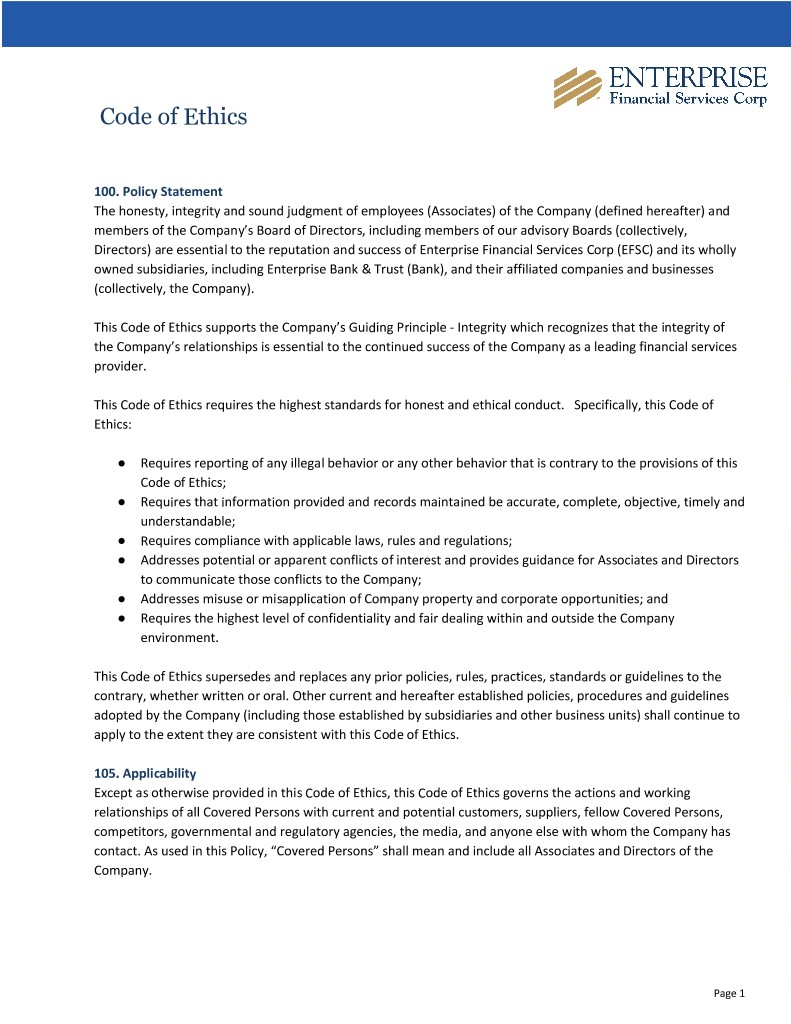
Code of Ethics 100. Policy Statement The honesty, integrity and sound judgment of employees (Associates) of the Company (defined hereafter) and members of the Company’s Board of Directors, including members of our advisory Boards (collectively, Directors) are essential to the reputation and success of Enterprise Financial Services Corp (EFSC) and its wholly owned subsidiaries, including Enterprise Bank & Trust (Bank), and their affiliated companies and businesses (collectively, the Company). This Code of Ethics supports the Company’s Guiding Principle - Integrity which recognizes that the integrity of the Company’s relationships is essential to the continued success of the Company as a leading financial services provider. This Code of Ethics requires the highest standards for honest and ethical conduct. Specifically, this Code of Ethics: ● Requires reporting of any illegal behavior or any other behavior that is contrary to the provisions of this Code of Ethics; ● Requires that information provided and records maintained be accurate, complete, objective, timely and understandable; ● Requires compliance with applicable laws, rules and regulations; ● Addresses potential or apparent conflicts of interest and provides guidance for Associates and Directors to communicate those conflicts to the Company; ● Addresses misuse or misapplication of Company property and corporate opportunities; and ● Requires the highest level of confidentiality and fair dealing within and outside the Company environment. This Code of Ethics supersedes and replaces any prior policies, rules, practices, standards or guidelines to the contrary, whether written or oral. Other current and hereafter established policies, procedures and guidelines adopted by the Company (including those established by subsidiaries and other business units) shall continue to apply to the extent they are consistent with this Code of Ethics. 105. Applicability Except as otherwise provided in this Code of Ethics, this Code of Ethics governs the actions and working relationships of all Covered Persons with current and potential customers, suppliers, fellow Covered Persons, competitors, governmental and regulatory agencies, the media, and anyone else with whom the Company has contact. As used in this Policy, “Covered Persons” shall mean and include all Associates and Directors of the Company. Page 1
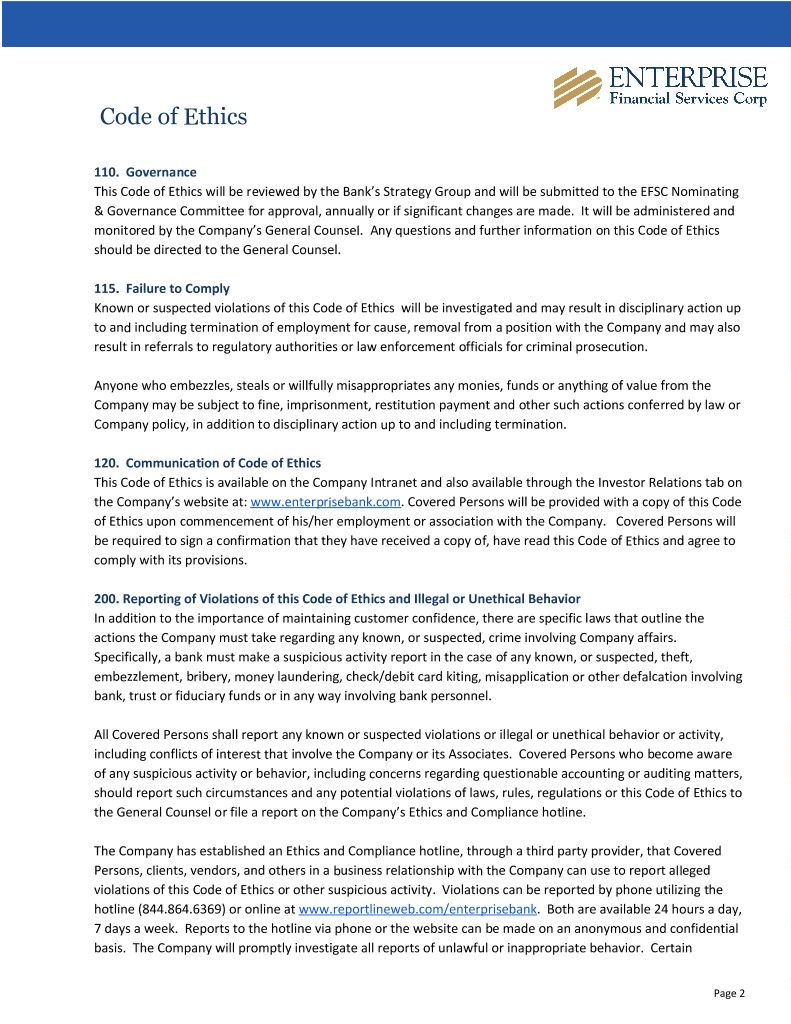
Code of Ethics 110. Governance This Code of Ethics will be reviewed by the Bank’s Strategy Group and will be submitted to the EFSC Nominating & Governance Committee for approval, annually or if significant changes are made. It will be administered and monitored by the Company’s General Counsel. Any questions and further information on this Code of Ethics should be directed to the General Counsel. 115. Failure to Comply Known or suspected violations of this Code of Ethics will be investigated and may result in disciplinary action up to and including termination of employment for cause, removal from a position with the Company and may also result in referrals to regulatory authorities or law enforcement officials for criminal prosecution. Anyone who embezzles, steals or willfully misappropriates any monies, funds or anything of value from the Company may be subject to fine, imprisonment, restitution payment and other such actions conferred by law or Company policy, in addition to disciplinary action up to and including termination. 120. Communication of Code of Ethics This Code of Ethics is available on the Company Intranet and also available through the Investor Relations tab on the Company’s website at: www.enterprisebank.com. Covered Persons will be provided with a copy of this Code of Ethics upon commencement of his/her employment or association with the Company. Covered Persons will be required to sign a confirmation that they have received a copy of, have read this Code of Ethics and agree to comply with its provisions. 200. Reporting of Violations of this Code of Ethics and Illegal or Unethical Behavior In addition to the importance of maintaining customer confidence, there are specific laws that outline the actions the Company must take regarding any known, or suspected, crime involving Company affairs. Specifically, a bank must make a suspicious activity report in the case of any known, or suspected, theft, embezzlement, bribery, money laundering, check/debit card kiting, misapplication or other defalcation involving bank, trust or fiduciary funds or in any way involving bank personnel. All Covered Persons shall report any known or suspected violations or illegal or unethical behavior or activity, including conflicts of interest that involve the Company or its Associates. Covered Persons who become aware of any suspicious activity or behavior, including concerns regarding questionable accounting or auditing matters, should report such circumstances and any potential violations of laws, rules, regulations or this Code of Ethics to the General Counsel or file a report on the Company’s Ethics and Compliance hotline. The Company has established an Ethics and Compliance hotline, through a third party provider, that Covered Persons, clients, vendors, and others in a business relationship with the Company can use to report alleged violations of this Code of Ethics or other suspicious activity. Violations can be reported by phone utilizing the hotline (844.864.6369) or online at www.reportlineweb.com/enterprisebank. Both are available 24 hours a day, 7 days a week. Reports to the hotline via phone or the website can be made on an anonymous and confidential basis. The Company will promptly investigate all reports of unlawful or inappropriate behavior. Certain Page 2
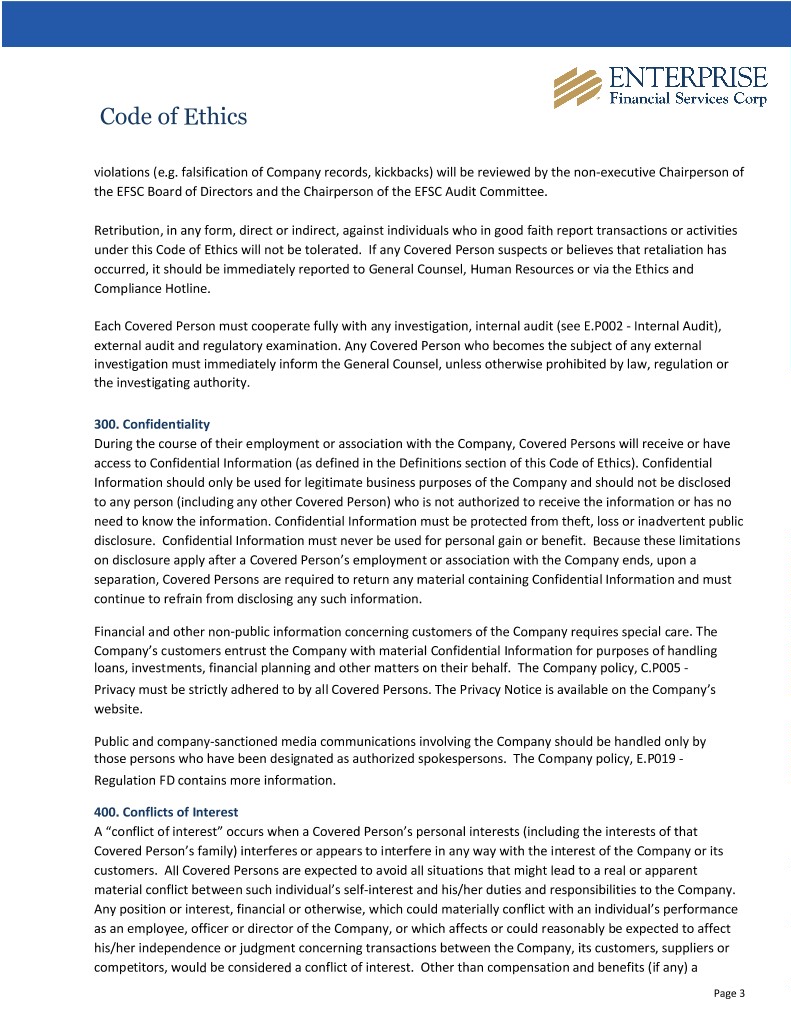
Code of Ethics violations (e.g. falsification of Company records, kickbacks) will be reviewed by the non-executive Chairperson of the EFSC Board of Directors and the Chairperson of the EFSC Audit Committee. Retribution, in any form, direct or indirect, against individuals who in good faith report transactions or activities under this Code of Ethics will not be tolerated. If any Covered Person suspects or believes that retaliation has occurred, it should be immediately reported to General Counsel, Human Resources or via the Ethics and Compliance Hotline. Each Covered Person must cooperate fully with any investigation, internal audit (see E.P002 - Internal Audit), external audit and regulatory examination. Any Covered Person who becomes the subject of any external investigation must immediately inform the General Counsel, unless otherwise prohibited by law, regulation or the investigating authority. 300. Confidentiality During the course of their employment or association with the Company, Covered Persons will receive or have access to Confidential Information (as defined in the Definitions section of this Code of Ethics). Confidential Information should only be used for legitimate business purposes of the Company and should not be disclosed to any person (including any other Covered Person) who is not authorized to receive the information or has no need to know the information. Confidential Information must be protected from theft, loss or inadvertent public disclosure. Confidential Information must never be used for personal gain or benefit. Because these limitations on disclosure apply after a Covered Person’s employment or association with the Company ends, upon a separation, Covered Persons are required to return any material containing Confidential Information and must continue to refrain from disclosing any such information. Financial and other non-public information concerning customers of the Company requires special care. The Company’s customers entrust the Company with material Confidential Information for purposes of handling loans, investments, financial planning and other matters on their behalf. The Company policy, C.P005 - Privacy must be strictly adhered to by all Covered Persons. The Privacy Notice is available on the Company’s website. Public and company-sanctioned media communications involving the Company should be handled only by those persons who have been designated as authorized spokespersons. The Company policy, E.P019 - Regulation FD contains more information. 400. Conflicts of Interest A “conflict of interest” occurs when a Covered Person’s personal interests (including the interests of that Covered Person’s family) interferes or appears to interfere in any way with the interest of the Company or its customers. All Covered Persons are expected to avoid all situations that might lead to a real or apparent material conflict between such individual’s self-interest and his/her duties and responsibilities to the Company. Any position or interest, financial or otherwise, which could materially conflict with an individual’s performance as an employee, officer or director of the Company, or which affects or could reasonably be expected to affect his/her independence or judgment concerning transactions between the Company, its customers, suppliers or competitors, would be considered a conflict of interest. Other than compensation and benefits (if any) a Page 3
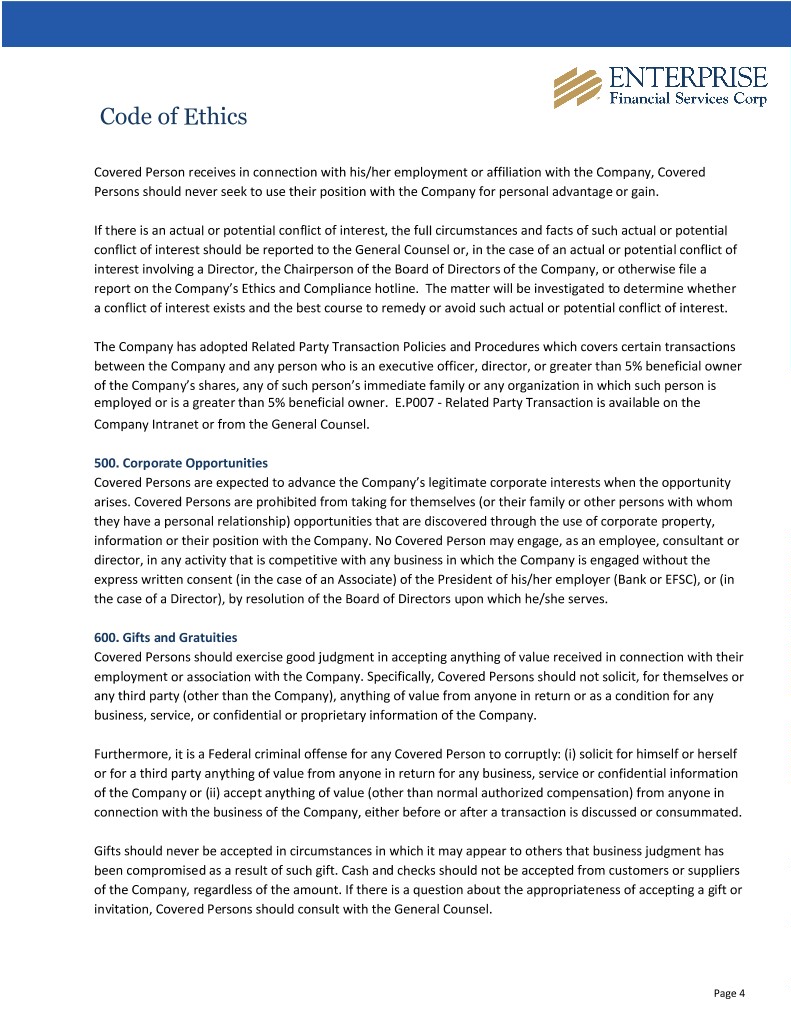
Code of Ethics Covered Person receives in connection with his/her employment or affiliation with the Company, Covered Persons should never seek to use their position with the Company for personal advantage or gain. If there is an actual or potential conflict of interest, the full circumstances and facts of such actual or potential conflict of interest should be reported to the General Counsel or, in the case of an actual or potential conflict of interest involving a Director, the Chairperson of the Board of Directors of the Company, or otherwise file a report on the Company’s Ethics and Compliance hotline. The matter will be investigated to determine whether a conflict of interest exists and the best course to remedy or avoid such actual or potential conflict of interest. The Company has adopted Related Party Transaction Policies and Procedures which covers certain transactions between the Company and any person who is an executive officer, director, or greater than 5% beneficial owner of the Company’s shares, any of such person’s immediate family or any organization in which such person is employed or is a greater than 5% beneficial owner. E.P007 - Related Party Transaction is available on the Company Intranet or from the General Counsel. 500. Corporate Opportunities Covered Persons are expected to advance the Company’s legitimate corporate interests when the opportunity arises. Covered Persons are prohibited from taking for themselves (or their family or other persons with whom they have a personal relationship) opportunities that are discovered through the use of corporate property, information or their position with the Company. No Covered Person may engage, as an employee, consultant or director, in any activity that is competitive with any business in which the Company is engaged without the express written consent (in the case of an Associate) of the President of his/her employer (Bank or EFSC), or (in the case of a Director), by resolution of the Board of Directors upon which he/she serves. 600. Gifts and Gratuities Covered Persons should exercise good judgment in accepting anything of value received in connection with their employment or association with the Company. Specifically, Covered Persons should not solicit, for themselves or any third party (other than the Company), anything of value from anyone in return or as a condition for any business, service, or confidential or proprietary information of the Company. Furthermore, it is a Federal criminal offense for any Covered Person to corruptly: (i) solicit for himself or herself or for a third party anything of value from anyone in return for any business, service or confidential information of the Company or (ii) accept anything of value (other than normal authorized compensation) from anyone in connection with the business of the Company, either before or after a transaction is discussed or consummated. Gifts should never be accepted in circumstances in which it may appear to others that business judgment has been compromised as a result of such gift. Cash and checks should not be accepted from customers or suppliers of the Company, regardless of the amount. If there is a question about the appropriateness of accepting a gift or invitation, Covered Persons should consult with the General Counsel. Page 4
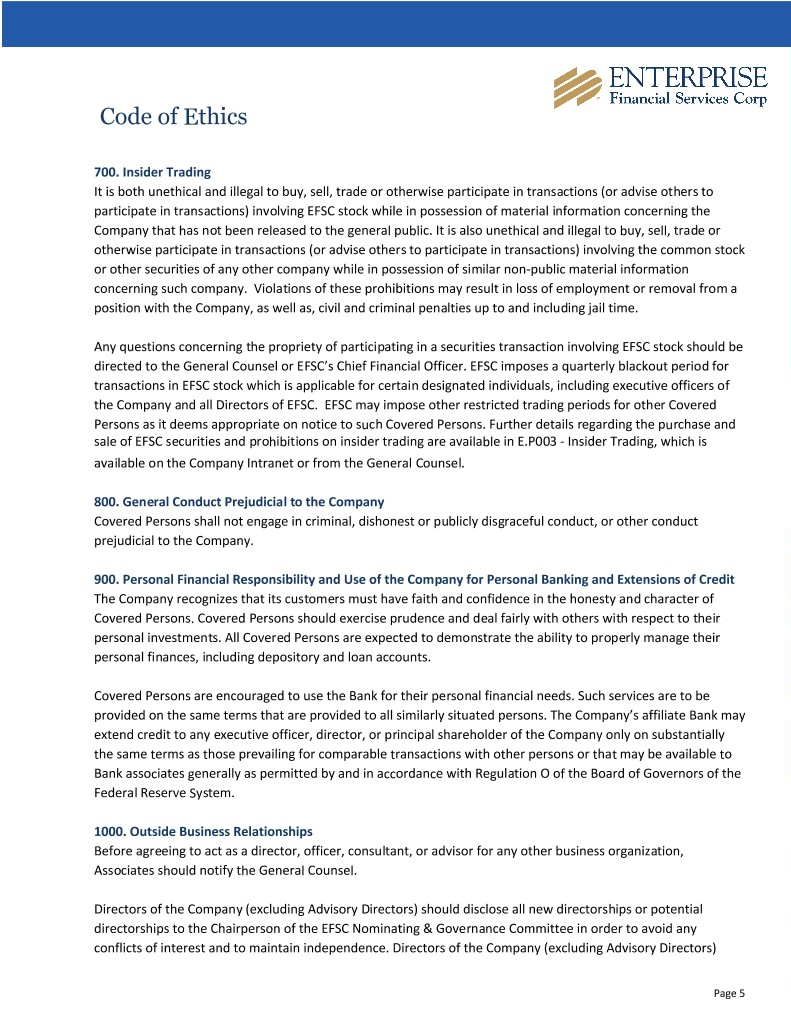
Code of Ethics 700. Insider Trading It is both unethical and illegal to buy, sell, trade or otherwise participate in transactions (or advise others to participate in transactions) involving EFSC stock while in possession of material information concerning the Company that has not been released to the general public. It is also unethical and illegal to buy, sell, trade or otherwise participate in transactions (or advise others to participate in transactions) involving the common stock or other securities of any other company while in possession of similar non-public material information concerning such company. Violations of these prohibitions may result in loss of employment or removal from a position with the Company, as well as, civil and criminal penalties up to and including jail time. Any questions concerning the propriety of participating in a securities transaction involving EFSC stock should be directed to the General Counsel or EFSC’s Chief Financial Officer. EFSC imposes a quarterly blackout period for transactions in EFSC stock which is applicable for certain designated individuals, including executive officers of the Company and all Directors of EFSC. EFSC may impose other restricted trading periods for other Covered Persons as it deems appropriate on notice to such Covered Persons. Further details regarding the purchase and sale of EFSC securities and prohibitions on insider trading are available in E.P003 - Insider Trading, which is available on the Company Intranet or from the General Counsel. 800. General Conduct Prejudicial to the Company Covered Persons shall not engage in criminal, dishonest or publicly disgraceful conduct, or other conduct prejudicial to the Company. 900. Personal Financial Responsibility and Use of the Company for Personal Banking and Extensions of Credit The Company recognizes that its customers must have faith and confidence in the honesty and character of Covered Persons. Covered Persons should exercise prudence and deal fairly with others with respect to their personal investments. All Covered Persons are expected to demonstrate the ability to properly manage their personal finances, including depository and loan accounts. Covered Persons are encouraged to use the Bank for their personal financial needs. Such services are to be provided on the same terms that are provided to all similarly situated persons. The Company’s affiliate Bank may extend credit to any executive officer, director, or principal shareholder of the Company only on substantially the same terms as those prevailing for comparable transactions with other persons or that may be available to Bank associates generally as permitted by and in accordance with Regulation O of the Board of Governors of the Federal Reserve System. 1000. Outside Business Relationships Before agreeing to act as a director, officer, consultant, or advisor for any other business organization, Associates should notify the General Counsel. Directors of the Company (excluding Advisory Directors) should disclose all new directorships or potential directorships to the Chairperson of the EFSC Nominating & Governance Committee in order to avoid any conflicts of interest and to maintain independence. Directors of the Company (excluding Advisory Directors) Page 5
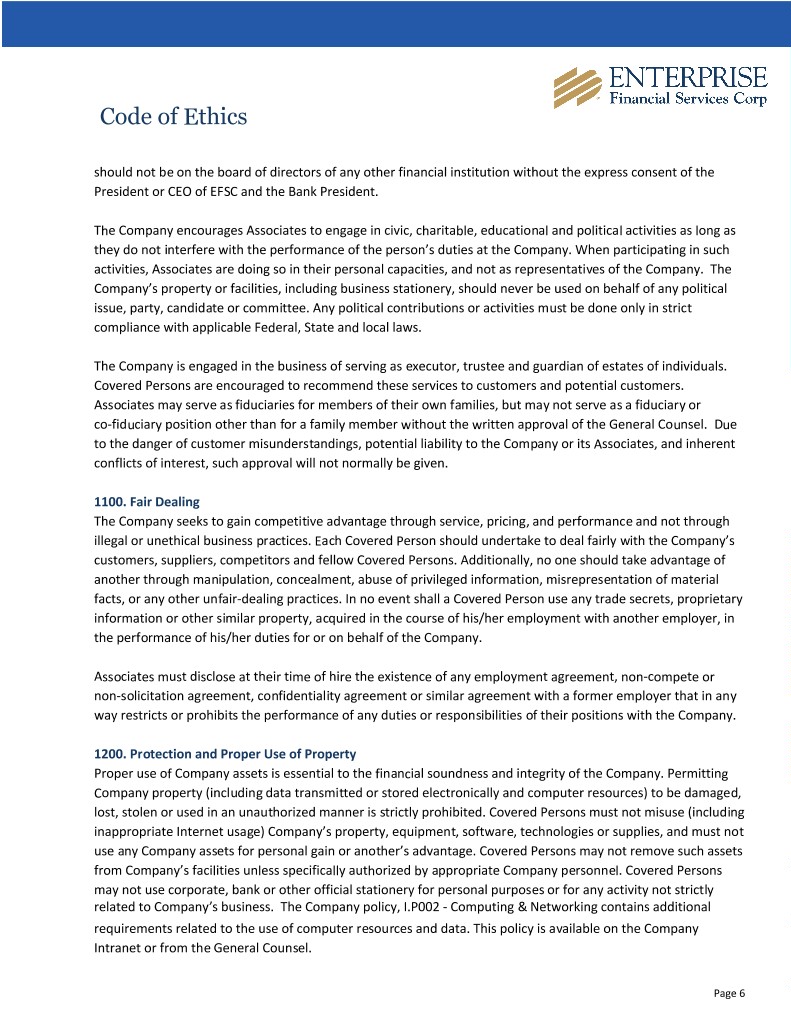
Code of Ethics should not be on the board of directors of any other financial institution without the express consent of the President or CEO of EFSC and the Bank President. The Company encourages Associates to engage in civic, charitable, educational and political activities as long as they do not interfere with the performance of the person’s duties at the Company. When participating in such activities, Associates are doing so in their personal capacities, and not as representatives of the Company. The Company’s property or facilities, including business stationery, should never be used on behalf of any political issue, party, candidate or committee. Any political contributions or activities must be done only in strict compliance with applicable Federal, State and local laws. The Company is engaged in the business of serving as executor, trustee and guardian of estates of individuals. Covered Persons are encouraged to recommend these services to customers and potential customers. Associates may serve as fiduciaries for members of their own families, but may not serve as a fiduciary or co-fiduciary position other than for a family member without the written approval of the General Counsel. Due to the danger of customer misunderstandings, potential liability to the Company or its Associates, and inherent conflicts of interest, such approval will not normally be given. 1100. Fair Dealing The Company seeks to gain competitive advantage through service, pricing, and performance and not through illegal or unethical business practices. Each Covered Person should undertake to deal fairly with the Company’s customers, suppliers, competitors and fellow Covered Persons. Additionally, no one should take advantage of another through manipulation, concealment, abuse of privileged information, misrepresentation of material facts, or any other unfair-dealing practices. In no event shall a Covered Person use any trade secrets, proprietary information or other similar property, acquired in the course of his/her employment with another employer, in the performance of his/her duties for or on behalf of the Company. Associates must disclose at their time of hire the existence of any employment agreement, non-compete or non-solicitation agreement, confidentiality agreement or similar agreement with a former employer that in any way restricts or prohibits the performance of any duties or responsibilities of their positions with the Company. 1200. Protection and Proper Use of Property Proper use of Company assets is essential to the financial soundness and integrity of the Company. Permitting Company property (including data transmitted or stored electronically and computer resources) to be damaged, lost, stolen or used in an unauthorized manner is strictly prohibited. Covered Persons must not misuse (including inappropriate Internet usage) Company’s property, equipment, software, technologies or supplies, and must not use any Company assets for personal gain or another’s advantage. Covered Persons may not remove such assets from Company’s facilities unless specifically authorized by appropriate Company personnel. Covered Persons may not use corporate, bank or other official stationery for personal purposes or for any activity not strictly related to Company’s business. The Company policy, I.P002 - Computing & Networking contains additional requirements related to the use of computer resources and data. This policy is available on the Company Intranet or from the General Counsel. Page 6
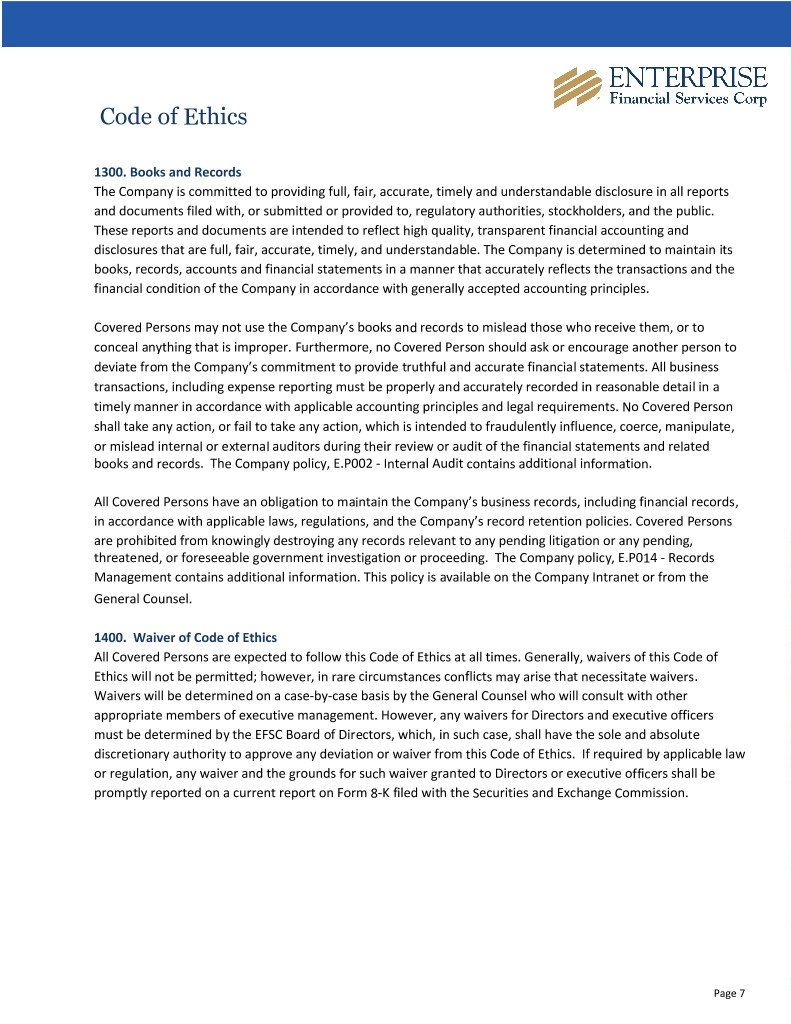
Code of Ethics 1300. Books and Records The Company is committed to providing full, fair, accurate, timely and understandable disclosure in all reports and documents filed with, or submitted or provided to, regulatory authorities, stockholders, and the public. These reports and documents are intended to reflect high quality, transparent financial accounting and disclosures that are full, fair, accurate, timely, and understandable. The Company is determined to maintain its books, records, accounts and financial statements in a manner that accurately reflects the transactions and the financial condition of the Company in accordance with generally accepted accounting principles. Covered Persons may not use the Company’s books and records to mislead those who receive them, or to conceal anything that is improper. Furthermore, no Covered Person should ask or encourage another person to deviate from the Company’s commitment to provide truthful and accurate financial statements. All business transactions, including expense reporting must be properly and accurately recorded in reasonable detail in a timely manner in accordance with applicable accounting principles and legal requirements. No Covered Person shall take any action, or fail to take any action, which is intended to fraudulently influence, coerce, manipulate, or mislead internal or external auditors during their review or audit of the financial statements and related books and records. The Company policy, E.P002 - Internal Audit contains additional information. All Covered Persons have an obligation to maintain the Company’s business records, including financial records, in accordance with applicable laws, regulations, and the Company’s record retention policies. Covered Persons are prohibited from knowingly destroying any records relevant to any pending litigation or any pending, threatened, or foreseeable government investigation or proceeding. The Company policy, E.P014 - Records Management contains additional information. This policy is available on the Company Intranet or from the General Counsel. 1400. Waiver of Code of Ethics All Covered Persons are expected to follow this Code of Ethics at all times. Generally, waivers of this Code of Ethics will not be permitted; however, in rare circumstances conflicts may arise that necessitate waivers. Waivers will be determined on a case-by-case basis by the General Counsel who will consult with other appropriate members of executive management. However, any waivers for Directors and executive officers must be determined by the EFSC Board of Directors, which, in such case, shall have the sole and absolute discretionary authority to approve any deviation or waiver from this Code of Ethics. If required by applicable law or regulation, any waiver and the grounds for such waiver granted to Directors or executive officers shall be promptly reported on a current report on Form 8-K filed with the Securities and Exchange Commission. Page 7
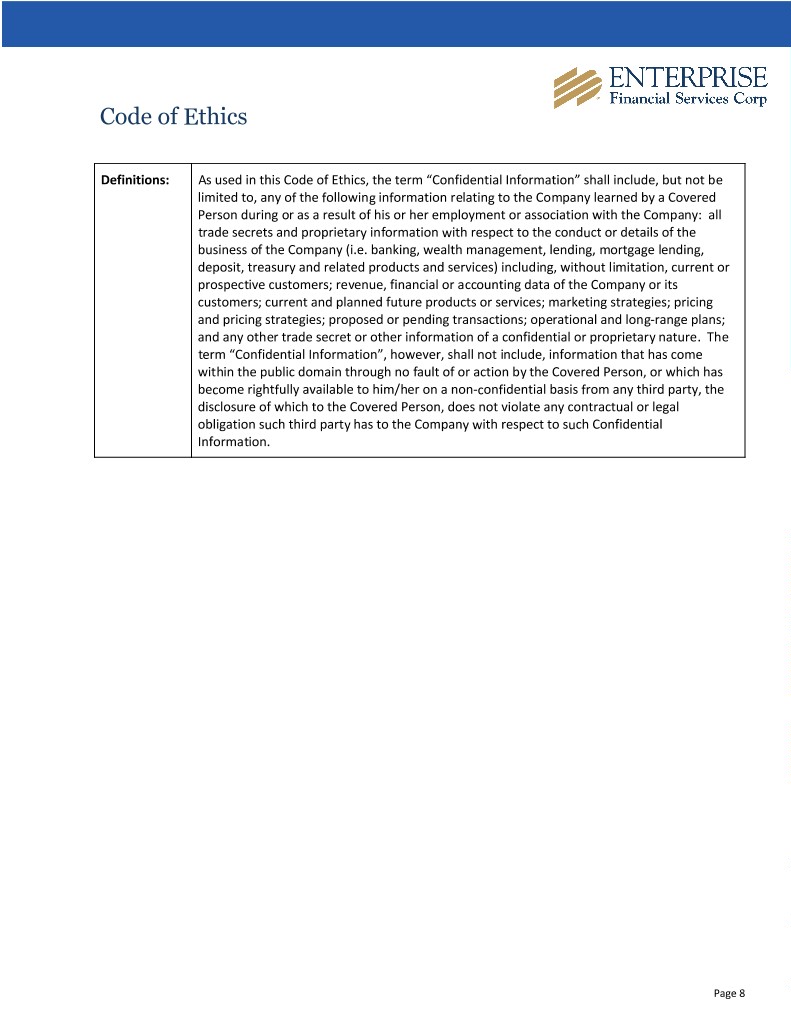
Code of Ethics Definitions: As used in this Code of Ethics, the term “Confidential Information” shall include, but not be limited to, any of the following information relating to the Company learned by a Covered Person during or as a result of his or her employment or association with the Company: all trade secrets and proprietary information with respect to the conduct or details of the business of the Company (i.e. banking, wealth management, lending, mortgage lending, deposit, treasury and related products and services) including, without limitation, current or prospective customers; revenue, financial or accounting data of the Company or its customers; current and planned future products or services; marketing strategies; pricing and pricing strategies; proposed or pending transactions; operational and long-range plans; and any other trade secret or other information of a confidential or proprietary nature. The term “Confidential Information”, however, shall not include, information that has come within the public domain through no fault of or action by the Covered Person, or which has become rightfully available to him/her on a non-confidential basis from any third party, the disclosure of which to the Covered Person, does not violate any contractual or legal obligation such third party has to the Company with respect to such Confidential Information. Page 8
